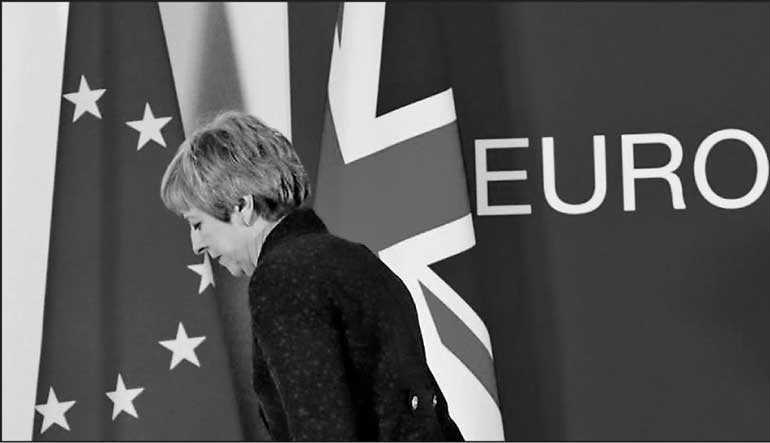Thursday Feb 19, 2026
Thursday Feb 19, 2026
Saturday, 23 March 2019 00:10 - - {{hitsCtrl.values.hits}}

Britain’s Prime Minister Theresa May leaves after giving a news briefing in Brussels, Belgium 22 March – Reuters
BRUSSELS (Reuters): European Union leaders have given Prime Minister Theresa May two weeks’ reprieve, until 12 April, before Britain could lurch out of the EU if she fails to persuade MPs to back the withdrawal treaty she concluded with Brussels.
But after seven hours of summit brainstorming on Thursday, her 27 peers kept a host of options open, ramping up pressure on parliament to support May, giving Britain an outside chance of staying in for much longer - but also preparing to deflect blame for the chaos of any no-deal Brexit.
May had wanted to be able to delay Britain’s departure until June 30 to tie up legislative loose ends, and tried to reassure the EU that she could overturn two heavy defeats to clinch a last-gasp parliamentary ratification of her deal next week, so allowing a status-quo transition period to come into effect.
EU leaders had planned to endorse a shorter extension, to 22 May, the eve of EU parliamentary elections, and leave any discussion of how to deal with May losing until next week. But diplomats said the prime minister singularly failed to reassure them she could win. Some sensed she did not believe it herself.
After May left the room, and with French President Emmanuel Macron pitching a surprise ultimatum for Britain to be out, deal or no deal, by 7 May — the eve of a summit on the EU’s post-Brexit future — the meeting plunged into frantic debate.
The outcome, with which May declared herself satisfied, was that the 22 May date will apply if parliament rallies behind her next week. If it does not, Britain will have until 12 April to offer a new plan or choose to quit without a treaty.
That date corresponds to the six weeks’ legal notice required for the EU election - which the Union would insist Britain hold on 23 May if it remains a member. If it does not hold the election, leaders said, the very last date Britain must leave would be June 30, before the new EU parliament convenes.
“Options remain open”
Until 12 April, said summit chair Donald Tusk, “all options will remain open and the cliff-edge date will be delayed”.
“The UK government will still have a choice between a deal, no deal, a long extension or revoking Article 50 (the withdrawal notice),” he told a news conference.
If Britain decides by 12 April against holding the EU election, it could then leave the EU without a deal at any time up to 22 May.
May said she would not cancel Brexit or seek a long delay that would mean asking people to vote in EU elections three years after voting to leave. She insisted she could secure a deal next week.
Many in London doubt that, not least after she offended many MPs on Wednesday by publicly blaming them for the deadlock. She tried to soften those remarks somewhat on Thursday.
“What this decision tonight does is show the clear choice that is open to MPs,” May said. “I think the choice is clear for people.”
But May’s stated belief in her strategy of a third vote did not communicate itself to the summit table.
“It did not go well,” said one EU official familiar with the talks. “They basically realised that she doesn’t really believe it herself. They don’t want to be seen to be forcing the Brits out now. But they are looking for ways to end the agony.”
While some brinkmanship from Brussels may be part of a strategy to bounce reluctant British legislators into backing May, there is also a growing impatience that efforts to avoid a messy Brexit are bogging the EU down when it has other priorities, from a weakening economy to rising nationalism.